Past Events
- Multiple Presenters
- 1500 Posvar Hall
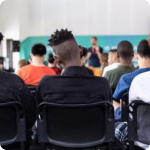
- Jennifer C. Sarrett, PhD, MEd
- Zoom
In this talk, Dr. Sarrett will discuss her research on parental and professional experiences of autism in Kerala, India and Atlanta, Georgia. This work demonstrates how Westernization influences the ways non-Western cultures integrate concepts of autism into their cultural concepts of illness, family, and normality. She will discuss this work in the context of global bioethics, global disability studies, and the unidirectional nature of psychiatric influence. Register on the Zoom link!
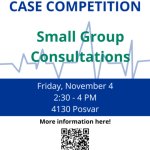
- Multiple Presenters
- 4130 Posvar Hall

- Multiple Presenters
This semester's 2022 Micro-Course will focus on humanity’s use of technology and the disparate impacts on and benefits to the environment and varying groups of people. This will include discussion around the material, environmental, and health costs of extracting materials necessary to technological development and production as well as the waste created by the consumption habits initiated by global reliance on technology. It will also include a discussion of technology’s role in advancing sustainability.
In this four-part weekend micro-course (spanning four semesters), we will examine the power of technology on humanity and its implications on social justice in four areas: governance, environment, education, and health. Information about the speakers is on our website!

- Professor Edda L. Fields-Black, Department of History, Carnegie Mellon University
In the first installment of the Global Studies Center's Two Evenings, Professor Edda L. Fields-Black from Carnegie Mellon University will facilitate a discussion on author Clint Smith's How the Word is Passed: A Reckoning with the History of Slavery Across America. A deeply researched and transporting exploration of the legacy of slavery and its imprint on centuries of American history, How the Word Is Passed illustrates how some of our country's most essential stories are hidden in plain view—whether in places we might drive by on our way to work, holidays such as Juneteenth, or entire neighborhoods like downtown Manhattan, where the brutal history of the trade in enslaved men, women, and children has been deeply imprinted.
Global Literary Encounters book discussions are pre-lecture discussions that align with the Pittsburgh Arts & Lecture's Ten Evenings series. Global Literary Encounters put prominent world authors and their work in a global perspective in order to provide additional insight on writers and engaging issues.
This discussion will be held on Zoom. Please register to receive the Zoom link before the event.
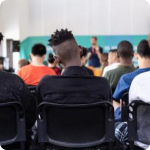
- Sonia Rupcic, PhD, ACLS Fellow (American Council of Learned Societies), Postdoctoral Fellow at the Population Studies and Training Center at Brown University, Visiting Scholar in Gender, Sexuality and Women's Studies at the University of Pittsburgh
- Zoom
Content warnings have become an important feature of pedagogical practice. In this talk and discussion, I reflect on my experiences as a junior scholar trying to promote ethnographic research on topics that are triggering. I focus on “shopping” a book manuscript on sexual violence as a process beset by competing imperatives to engage ethically, to support the mental health of others, to adhere to disciplinary conventions around “thick description,” and to market the book as attracting a wide readership. Register on the Zoom link!
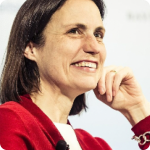
- Fiona Hill
- Alumni Hall, Auditorium, 7th Floor
Dr. Fiona Hill, Senior Fellow at the Brookings Institution and Former Senior Director for European and Russian Affairs on the National Security Council, will discuss her experience in the Trump administration, including her testimony during President Trump's first impeachment inquiry. Dr. Hill will also discuss Vladimir Putin's authoritarian vision for Russia, the subject of her new co-authored article in the centennial issue of Foreign Affairs. Finally, Dr. Hill will address her remarkable journey from a coal mining community in northeastern England to serving three American presidents and what she has learned along the way about the best way to safeguard American democracy, the subject of her recent memoir, There Is Nothing For You Here.
Books available for purchase

- Pitt Global Hub, 1st Floor Posvar Hall
- Dr. Horia Dijmarescu, Capstone Professor and Elaine Linn, GSC Academic Advisor
- 4217 Posvar Hall
Are you passionate about an issue within the realm of Global Studies? The Global Studies Center BPhil degree provides students with the opportunity to develop an interdisciplinary research project under the mentorship of their chosen professor. Meet with current BPhil seniors, academic advisor Elaine Linn, and capstone professor Dr. Horia Dijmarescu to learn about the optimal timelines, opportunities for research, how to get started, the role of the faculty mentor, and more!
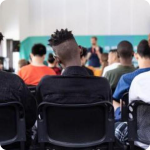
- Rania Awaad, MD, Clinical Associate Professor of Psychiatry, Stanford University
- Zoom
The first psychiatric hospitals in the world were established as early as the 8th century during the Islamic Renaissance. Despite the emergence of a highly sophisticated and interdisciplinary system of understanding the human psyche in early Islamic history, most students of modern psychology are unfamiliar with this rich history. This lecture will provide a historical and contemporary review of the Islamic intellectual heritage as it pertains to modern behavioral science and how mental illness was historically perceived and treated in the Muslim world. (Continuing medical education credit will be available.) Register on the Zoom link!
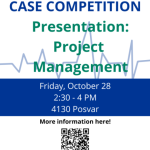
- Multiple Presenters
- 4130 Posvar Hall
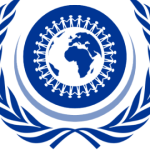
- William Pitt Union, Pitt-Oakland Campus Model United Nations high school simulation
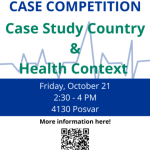
- Multiple Presenters
- 4130 Posvar Hall

- Jay D. Aronson, PhD, Professor of Science, Technology, and Society, Director of the Center for Human Rights Science, Carnegie Mellon University
- Zoom
Abstract: Dr. Aronson recounts that “in this informal talk, I will focus on a few of the many ethical and moral dilemmas that I’ve faced working at the intersection of social science-oriented research and human rights practice for the past fifteen-plus years. Examples include my obligations to people I am interviewing about very painful moments in their lives (i.e., the deaths of loved ones); feelings of recurring regret (though I’m not even sure that’s the right word) about advancing my own career through the gathering and analysis of other peoples’ suffering; and, more generally, my responsibilities to the people I interact with who are in far more precarious positions than I am. Part of what I hope to accomplish during our hour together is just to clarify the actual ethical principles that underlie what I experience as feelings or thoughts that ‘keep me up at night.’”

- Whitney Abbott, Registered Nurse
- Public Health Commons: School of Public Health
Hear firsthand from practitioner, Whitney Abbott, who has chosen to follow a less common path in healthcare with the goal of decreasing neonatal and maternal mortality. Whitney is currently working as a Nurse Midwife for the Chickasaw Nation in Ada, Oklahoma with Registered Nurse Status since 2007. More information about Whitney can be found on her website.
- ‹ previous
- 26 of 60
- next ›
